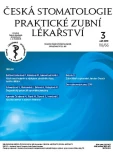Laser Use in Dentistry
Authors:
M. Kyjovská Čičváková 1; M. Riznič 1; E. Ďurovič 2; MDDr. Eleonóra Ivančová, PhD., MHA 1
Authors‘ workplace:
Klinika stomatológie a maxilofaciálnej chirurgie UNLP a LF UPJŚ, Košice
1; SKZL – Regionálna komora zubných lekárov, výbor pre vzdelávanie, Košice
2
Published in:
Česká stomatologie / Praktické zubní lékařství, ročník 118, 2018, 3, s. 73-80
Category:
Review Article
Overview
Background:
The term laser is an acronym for „Light Amplification by Stimulated Emission of Radiation“. The first laser was built in 1960 by Theodore H. Maiman. In the last two decades, there have been many studies of various laser applications. In the dental practices, lasers have become a standard feature enhancing treatment in both hard and soft tissue. In the application of laser in hard tissues is used for the prevention of tooth decay, to whiten the teeth, remove fillings and cavities and prevent dentin hypersentivity for diagnostics. The application insoft tissues includes healing of wounds, removing the hyperplasia of gingiva, for uncovering retention and semiretention of teeth, as well as for fotostimulation of herpetic lesion. It is successfully used in parodontology and mucogingival surgery. With the help of a laser we practise gingivectomy, gingivoplasty, frenulectomy, excision andincision of tissues for biopsy and the therapy of periodontal pockets.
Types of lasers:
Nowadays, different types of lasers (with different types of wavelengths) are used in dentistry. Dental lasers emit light of a certain wavelength in the visible spectra (blue, green, red) or they emit invisible light.
Conclusion:
The application of lasers brings many advantages, replacing conventional procedures in dentistry. Laser has a huge positive contribution; operations on soft tissues enable working precisely with minimal or no bleeding. With surgical intervention on hard tissues no vibrations occur, we avoid high temperatures in preparation, prevent microscopic fractures of enamel or a formation of a smear layer which worsens the adhesion of the filling. Besides having antibacterial effects, the laser has proved to be a useful equipment to increase the effectivity, specification, simplicity and cost of dental treatment.
Keywords:
laser – applications – treatment – dentistry
Sources
1. Aoki, A., Ando, Y., Watanabe, H., Ishikawa, I.: In vitro studies on laser scaling of subgingival calculus with an Er:YAG laser. J. Periodontal., roč. 65, 1994, s. 1097–1106.
2. Betka, J.: Principy CO2 laseru a jeho využití v medicíne. In Novinky v medicíne, Praha: Avicenum, 1990, s. 7-44, ISBN 80-201-0096-2.
3. Convissar, R.: Principles and Practice of Laser Dentistry [online]. Missouri: Elsevier Health Sciences, 2010 [cit. 2014-12-07]. Dostupné na: http://books.google.sk/books?id=C0weN_XdaiAC&dq=history+of+laser+in+dentistry&hl=sk&source=gbs_navlinks_s. ISBN 978-0-323-06206-0.
4. Eberhard, J., Ehles, H., a kol.: Efficacy of subgingival calculus removal with Er:YAG laser compared to mechanical debridement: an in situ study. J. clin. Periodontal., 2003, s. 511–518.
5. Engst, P., Horák, M.: Aplikace laserů. Populární přednášky o fyzice. Praha: Nakladatelství technické literatury, 1989.
6. Hibst, R., Keller, U., Steiner, R.: Die Wirkung gepulster Er:YAG-Laserstrahlung auf Zahngewebe. Lasers Med. Surg., roč. 4, 1988, s. 163–165.
7. Hibst, R., Stock, K., Gall, R., Keller, U.: Controlled tooth surface heating and sterilization by Er:YAG laser radiation. SPIE Proc. of lasers in dentistry, roč. 29, 1996, s. 119–126.
8. Kirpa, J.: Fundamentals of Laser Dentistry [online]. New Delhi: Jaypee Brothers Medical Publishers, 2011 [cit. 2014-12-07]. Dostupné na internete: http://books.google.sk/books?id=ReXopz32XcUC&hl=sk&source=gbs_navlinks_s. ISBN 978-93-5025-377-9.
9. Kováč, J., Kováč, D.: Možnosti aplikácie lasera v zubnom lekárstve pri endodontickom ošetrení. Lek. Obzor, roč. 59, 2010, č. 7–8, s. 286–299.
10. Kovaľová, E., a kol.: Orálna hygiena II., III. Prešov: Pavol Šidelský – Akcentprint, 2010, 670 s. ISBN:978-80-89295-24-1.
11. Kovaľová, E., Klamárová, T., Muller, A.: Orálna hygiena IV. Prešov: Prešovská univerzita v Prešově, 2012, 334 s. ISBN 978-80-555-0567-1.
12. Kovaľová, E., Novák, B.: Orálna hygiena V. Prešov: Prešovská univerzita v Prešove, 2013, 112 s. ISBN:978-80-89295-39-5.
13. Lavu, V., et al.: Root surface bio-modification with Erbium laser – A myth or a reality? Open Dent. J., roč. 30, 2015, č. 9, s.79–86.
14. Maden, I.: Review: The twin light concept in dentistry. J. Laser Health Academy, roč. 13, 2013, č. 1, s. 11–15.
15. Martens, L.: Lasers physics and a review of laser applications in dentistry for children. Official J. Paed. Dent., roč. 12, 2011, č. 2, s. 61–67.
16. Olivi, G., Genovese, M. D.: Laser restorative dentistry in children and adolescents. Official J. Paed. Dent., roč. 12, 2011, č. 2, p. 68–78.
17. Poleník, P.: Subgingivální ošetření v praxi zubního lékaře. Praha: Quintenssenz, 2008. 2001S. ISBN:978-80-8679-04-5.
18. Poleník, P.: Možnosti použití diodového laseru 980 nm ve stomatologii. LKS., roč. 22, 2003, č. 1, 24 s.
19. Sari, T.: Office bleaching with Er:YAG laser. J. Laser Health Acad., roč. 20, 2013, č. 1, s. 55–60.
20. Scott, B.: Laser Dentistry: Mainstream after 25 years. Compendium Continuing Educ. Dentistry, roč. 32 Spec., č. 4, s. 16-17.
21. Schwarz, A., a kol.: Periodontal treatment with an Er:YAG laser or scaling and root planing, a 2-year follow-up split-mouth study. J. Periodontol., roč. 74, 2003, č. 5: s. 590–596.
22. Stock, K., Hibst, R., Keller, U.: Comparison of Er:YAG and Er:YSGG laser ablation of dental hard tissue. SPIE., roč. 31 1997, s. 88–95.
23. Tseng, P, Liew, V.: The potential of Nd:YAG dental laser in periodontal treatment. Periodontology, roč. 39, 1990, č. 1, s. 20–21.
24. Tvrdoň, M., a kol.: Protetická stomatológia, liečba a prevencia. 2. vyd. Bratislava: Science 2001, 2006, 581 s. ISBN 80-969524-4-7.
Labels
Maxillofacial surgery Orthodontics Dental medicineArticle was published in
Czech Dental Journal

2018 Issue 3
- What Effect Can Be Expected from Limosilactobacillus reuteri in Mucositis and Peri-Implantitis?
- The Importance of Limosilactobacillus reuteri in Administration to Diabetics with Gingivitis
Most read in this issue
- Relationship between Breastfeeding and Severe Early Childhood Caries
- Diagnostic Potential of the Synovial Fluid
- Laser Use in Dentistry
